 W
W"Addicted to You" is a song by Japanese-American recording artist Hikaru Utada from her second studio album Distance (2001). It was released as the album's lead single on September 6, 1999 by EMI Music Japan. "Addicted to You" was written by Utada and produced by Jimmy Jam & Terry Lewis; this is Utada's first collaboration with American producers and composers. The single artwork was shot by American photographer Richard Avedon and features two black-and-white figures of Utada. Musically, "Addicted to You" is an R&B song.
"Anata" is a song by Japanese-American singer-songwriter Hikaru Utada. It is their third single under the label Epic Records Japan, from their seventh Japanese-language studio album Hatsukoi. The song was used as a tie-in for movie Destiny: The Tale of Kamakura, and was released as a digital download on December 8. The song is their first movie tie-in in 5 years, since "Sakura Nagashi" was released in 2012 for Evangelion: 3.0 You Can (Not) Redo. The song was written with a Buddhist's view to show both the real and fantasy mixed world shown in the movie. Besides the movie, the song is also featured in a Sony campaign to promote a wireless headphone line, in which they themself also appears.
 W
W"Automatic" is a song recorded by Japanese–American singer Hikaru Utada, taken as the lead single from her debut album First Love (1999). It was released on December 9, 1998 through Toshiba-EMI in three physical formats: mini CD single, standard-size CD single and 12" vinyl. Additionally, the single included the A-side "Time Will Tell", which originally served as the B-side for these versions. The song was written and co-produced by Utada, while Akira Miyake and the singer's father Teruzane Utada served as producers. Despite working recording in English under the name Cubic U, "Automatic" is Utada's first Japanese recording, and was released after she enrolled into high school in Japan.
 W
W"Be My Last" is Hikaru Utada's 14th Japanese single, released on September 28, 2005. It was used for the 2005 film Spring Snow, an adaptation of the 1966 Yukio Mishima novel of the same name.
 W
W"Beautiful World" is a song by Japanese musician Hikaru Utada. It served as the theme song for Evangelion: 1.0 You Are (Not) Alone, the 2007 film reboot of the anime Neon Genesis Evangelion. It was released as a double A-side single on August 29, 2007 along with their song "Kiss & Cry", which had been released digitally three months earlier. In 2009, a remix of the song, "Beautiful World " served as the theme song of the second film in the series, Evangelion: 2.0 You Can (Not) Advance.
 W
W"Boku wa Kuma" is a song by Japanese singer-songwriter Hikaru Utada, serving as her 17th Japanese single and 24th single overall. The single was released on November 22, 2006, following the release of her previous studio album, Ultra Blue (2006). It came two months after the conclusion of Utada's United 2006 tour.
 W
W"Colors" is Hikaru Utada's 12th Japanese-language single, and is the only single they released in 2003. It was released on January 29, 2003 and debuted at number one on the Oricon charts with 437,903 copies sold in the first week, and became their fifth single to achieve two consecutive weeks at the number one slot, a comparatively rare feat. Two versions were released, CD and DVD.
 W
W"Come Back to Me" is a pop and R&B song by Japanese American pop singer Hikaru Utada, released under the moniker Utada. The song was written by Utada and Stargate and was produced by Utada, Stargate and her father, Sking U. "Come Back to Me" is the first single from her second English-language album This Is the One. In the United States, the song has peaked at number five on the Billboard Hot Dance Club Play and number 69 on the Pop 100 chart.
 W
W"Devil Inside" is Hikaru Utada's second English single, released under the name Utada. It is the second single from Exodus, and the first physical single released in the United States. Though it gained little mainstream attention, "Devil Inside" did do well on dance radio and hit number 10 on the Billboard Hot Dance Airplay chart, making it Utada's most played track in the United States until it was surpassed by "Come Back to Me".
 W
W"Dirty Desire" is a song by Japanese-American singer-songwriter Utada. The single was released exclusively in the fourth quarter of 2009 as a promotional single to US dance/club radio. The single later received a digital commercial release in December 2009 and peaked on the Billboard Dance/Club Charts at number 16.
 W
W"Easy Breezy" is Utada's debut English single. It is also the first single from Exodus, in which it also appears. For this release, they are using Island Def Jam as their label, under the name of simply Utada, rather than Hikaru Utada which was used for their Japanese releases. This was originally released as an exclusive download single, though was later released as a DVD single in Japan. This song has been used in several Nintendo DS endorsements featuring Utada. There was a promo single for Easy Breezy that was sent to radio stations that features an exclusive radio edit of the song. The cover is the same as for the DVD single. The single sold 2,731 copies in Korea.
 W
W"Eternally" is a song by Japanese musician Hikaru Utada, from their 2001 album Distance. It was re-arranged in 2008 as "Eternally " for use in the Maki Horikita starring Fuji TV drama Innocent Love. It was released as a digital single on October 31, 2008, and eventually released onto CD in March 2009, on an EMI compilation album I: Zutto, Zutto, Aishiteru .
 W
W"Exodus '04" is the 3rd English single by Utada and written by themself and Timbaland. It was released on June 21, 2005. It hit #24 on the Billboard Hot Dance/Club Airplay chart. Similarly to that of "Devil Inside," no music video was produced.
 W
W"Face My Fears" is a song by Japanese-American singer-songwriter Hikaru Utada and American record producer Skrillex, released on January 18, 2019, by Epic Records Japan. Along with its English-language counterpart, it serves as the opening theme song to the Square Enix video game Kingdom Hearts III. It was written as a collaboration between Utada, producer Skrillex, and R&B songwriter Poo Bear.
 W
W"Final Distance" is a song by Japanese recording artist Hikaru Utada for their third studio album Deep River (2002). Written by Utada themself, the song was produced and composed by long-time collaborators Akira Miyake, Utada's father Teruzane Utada and themself. "Final Distance" was originally recorded as "Distance" which was taken from the album with the same name, despite not being a single. The song was re-recorded and re-arranged after Utada learned that a young girl, who was inspired by Utada, had been murdered during the Osaka school massacre.
 W
W"First Love" is a song by Japanese-American singer-songwriter Hikaru Utada. It was released as their third Japanese language single on April 28, 1999, a month after the release of their debut album, First Love. It was certified double platinum for 800,000 copies shipped to stores across Japan.
"Flavor of Life" is Hikaru Utada's 18th Japanese single. The physical single was officially released on February 28, 2007.
 W
W"For You" is a song by Japanese-American musician Hikaru Utada. It was released as a double A-side single with the song "Time Limit" on June 30, 2000.
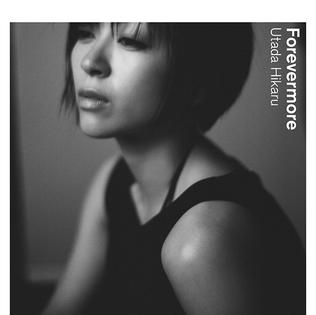 W
W"Forevermore" is a song by Japanese American singer-songwriter Hikaru Utada. It is their second single under the label Epic Records, from their upcoming seventh Japanese-language studio album, Hatsukoi. The song was used as a tie-in for TBS dorama Gomen, Aishiteru, their first single used in a drama of a commercial TV station since "Eternally " in 2008. It features the renowned drummer Chris Dave.
 W
W"Goodbye Happiness" is a song by Japanese singer-songwriter Hikaru Utada. It was released as the lead track from Utada's second Japanese compilation album, Utada Hikaru Single Collection Vol. 2, in November 2010. The song was commercially successful, topping Billboard's Japan Hot 100 chart in December 2010, and in January 2011 was certified gold by the RIAJ for more than 100,000 full-length downloads to cellphones.
 W
W"Hanataba o Kimi ni" is a song by Japanese singer-songwriter Hikaru Utada. It was released digitally 15 April 2016, alongside "Manatsu no Tōriame" as joint singles for her album Fantôme. The song was the theme to the dorama Toto Neechan. The single is Utada's first release since 2012's Evangelion: 3.0 theme song "Sakura Nagashi", and marks her official comeback to the Japanese music scene.
 W
W"Heart Station" is a song by Japanese musician Hikaru Utada, which was released as a double A-side single alongside her song "Stay Gold" on February 20, 2008. The title track for her album Heart Station, the song was heavily promoted on radio stations, for three weeks it was the number one song on the newly established Billboard Hot Top Airplay chart, despite only managing to reach number two on the Billboard Japan Hot 100.
 W
W"Hikari" is a song recorded by Japanese–American recording artist Hikaru Utada for her fourth studio and third Japanese language album, Deep River (2002). It premiered on March 20, 2002 as the third single from the album in Japan. It was written and composed by Utada, whilst production and arrangement was handled by Utada, her father Teruzane Utada, and long-time collaborator Miyake Akira. The single, and a remix by Russell McNamara, was used as the official Japanese theme song for the 2002 action role-playing video game Kingdom Hearts, and appeared on its original soundtrack respectively. Musically, "Hikari" is a pop folk song. Lyrically, it is about mysteries in life and human activities.
 W
W"Keep Tryin'" is a song recorded by Japanese recording artist Hikaru Utada for her sixth studio and fourth Japanese album, Ultra Blue (2006). It premiered on February 22, 2006 as the fifth single from the album in Japan. It was written and composed by Utada, whilst production was handled by Utada, her father Teruzane Utada, and Miyake Akira. It included the B-side track "Wings", which also appeared on the parent album. Musically, "Keep Tryin'" is a pop song with lyrics that contain self-empowerment themes. Upon its release, the track received generally mixed reviews from music critics.
 W
WBad Mode is the eighth Japanese-language studio album by Japanese–American singer Hikaru Utada. It is also her first bilingual album release, with songs in both Japanese and English. It was released by Sony Music Japan sublabel Epic Records Japan digitally on January 19, 2022, the same day as Utada's 39th birthday, and to be released physically on CD and limited CD-DVD-BD format bundle on February 23, 2022. The six previously-released songs were confirmed for the album track list, including the title track "Bad Mode", the Shiseido commercial song "Find Love" and the Kingdom Hearts III theme song "Face My Fears".
 W
W"Kiss & Cry" is a song recorded by Japanese recording artist Hikaru Utada for their seventh studio and fifth Japanese album, Heart Station (2007). It was written, composed, and arranged by Utada, whilst production was handled by Utada, their father Teruzane Utada, and Akira Miyake. The single premiered on May 31, 2007 as the third single from the album in Japan. It was re-released as a double A-side single with "Beautiful World", which also appeared on the parent album on August 29 in Japan, and digitally worldwide. Musically, "Kiss & Cry" is an R&B song, influenced by pop and hip-hop music. Lyrically, it discusses both Utada's upbringing and social beliefs between both Western and oriental regions.
 W
W"Letters" is a song by Japanese musician Hikaru Utada. It was released as a double A-side single with the song "Sakura Drops" on May 9, 2002.
 W
W"Lonely One" is a song by Japanese singer-songwriter Nariaki Obukuro, featuring Japanese-American singer-songwriter Hikaru Utada. The song was released on 17 January 2018 as the first single from Obukuro's debut studio album.
 W
W"Manatsu no Tōriame" is a song by Japanese singer-songwriter Hikaru Utada. It was released digitally 15 April 2016, alongside "Hanataba o Kimi ni" as joint singles for her album Fantôme. The song is the theme to NTV's news show NEWS ZERO. The single is Utada's first release since 2012's Evangelion: 3.0 theme song "Sakura Nagashi", and marks her official comeback to the Japanese music scene.
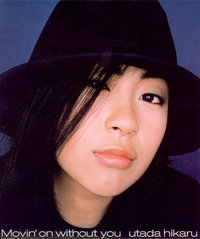 W
W"Movin' On Without You" is a song recorded by Japanese–American singer and producer Hikaru Utada taken from their debut studio album First Love (1999). The song was written, composed and produced by Utada themself, and became their first ever single to have been done by them. "Movin' On Without You" was written, produced and composed while Utada was attending college in Tokyo, Japan, during 1997. Utada, who received a record contract by Toshiba-EMI, had written an English-language version of the song, but the song remains unreleased.
 W
WOne Last Kiss is an extended play by Japanese-American musician Hikaru Utada, which was released in the US on March 9, 2021. It was released for promotion of the Japanese animated film Evangelion: 3.0+1.0 Thrice Upon a Time around the time of the film's release. It contains all the previously released theme songs that were made for the Rebuild of Evangelion film series. It also contains the theme song "One Last Kiss", which was co-produced by A. G. Cook and released in conjunction with the film on March 10, 2021.
 W
W"Ōzora de Dakishimete" is a song by Japanese American singer-songwriter Hikaru Utada. It is their first single under the label Epic Records Japan, from their upcoming seventh Japanese-language studio album, Hatsukoi. The song is being used as a tie-in for Suntory Water campaign starring Utada, starting on June 10, and was released as a digital download on July 10.
 W
W"Passion" is a song recorded by Japanese-American singer Hikaru Utada, taken as the fourth single from their studio album Ultra Blue (2006). It premiered on December 14, 2005, in two physical formats and for digital consumption, distributed by EMI Japan and EastWorld. "Passion", alongside its English counterpart "Sanctuary", were used as the national and international theme songs to the Square Enix video game Kingdom Hearts II (2005); the tracks serve as the successors to "Hikari" and its English counterpart, "Simple and Clean", which are found on Kingdom Hearts.
 W
WBad Mode is the eighth Japanese-language studio album by Japanese–American singer Hikaru Utada. It is also her first bilingual album release, with songs in both Japanese and English. It was released by Sony Music Japan sublabel Epic Records Japan digitally on January 19, 2022, the same day as Utada's 39th birthday, and to be released physically on CD and limited CD-DVD-BD format bundle on February 23, 2022. The six previously-released songs were confirmed for the album track list, including the title track "Bad Mode", the Shiseido commercial song "Find Love" and the Kingdom Hearts III theme song "Face My Fears".
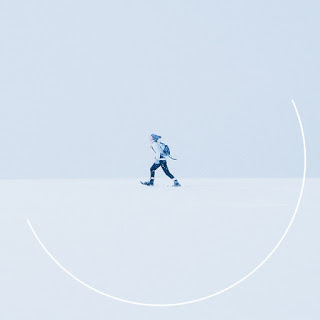 W
W"Play a Love Song" is a song by Japanese-American singer-songwriter Hikaru Utada. It is their fourth single under the label Epic Records Japan, from their seventh Japanese-language studio album Hatsukoi. The song was released as a digital download on April 25, 2018 and was being used as a tie-in for Tennensui Suntory Water.
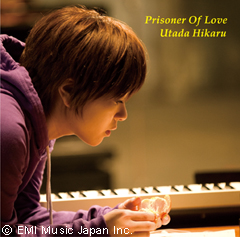 W
W"Prisoner of Love" is Hikaru Utada's 21st Japanese single and 30th single overall, and was released on May 21, 2008. This was her first Japanese recut single in nine years, after the first one "First Love" in 1999. It is also her first single to be released only in CD+DVD format. "Prisoner of Love" serves as the insert song for the Japanese television drama, Last Friends, while the original version is used in the opening theme. It won the Best Theme Song Award in the 57th Drama Academy Awards. "Prisoner of Love" was the 3rd most downloaded song in Japan during 2008.
 W
W"Sakura Drops" is a song by Japanese musician Hikaru Utada. It was released as a double A-side single with the song "Letters" on May 9, 2002.
 W
W"Sakura Nagashi" is a song by Japanese singer-songwriter Hikaru Utada. It was released by EMI Music Japan digitally on November 17, 2012, with a DVD single released December 26, 2012. The song is the theme to the third film of the Rebuild of Evangelion movie series, Evangelion: 3.0 You Can (Not) Redo, and was later included on their sixth Japanese-language studio album Fantôme, released in 2016. The single also marked Utada's last release under the then EMI-controlled EMI Music Japan as the label was absorbed into Universal Music Japan as EMI Records Japan in April 2013.
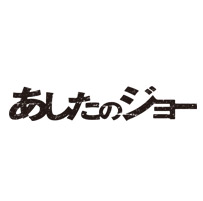 W
W"Show Me Love " is a song by Japanese singer-songwriter Hikaru Utada. Used as the theme song for the film Tomorrow's Joe (2011), it was released as a digital download preceding Utada's second Japanese compilation album, Utada Hikaru Single Collection Vol. 2, on November 17, 2010.
 W
W"Stay Gold" is a song by Japanese musician Hikaru Utada. Used in a high-profile campaign for Kao Corporation's Asience shampoo commercials in 2007, the song was released as a double A-side single with Utada's song "Heart Station" on February 20, 2008.
 W
W"Time" is a song by Japanese-American singer-songwriter Hikaru Utada, released on May 8, 2020, by Epic Records Japan. It served as the theme song for the NTV drama Bishoku Tantei Akechi Goro. The song was certified Gold by RIAJ for selling more than 100,000 digital downloads in Japan.
 W
W"Time Limit" is a song by Japanese musician Hikaru Utada. It was released as a double A-side single with the song "For You" on June 30, 2000.
 W
W"Time Will Tell" is a song recorded by Japanese–American singer Hikaru Utada, taken as the lead single from their debut album First Love (1999). It was released on December 9, 1998 through Toshiba-EMI in three physical formats: mini CD single, standard CD single and 12" vinyl. Additionally, the single was originally served as a B-side to "Automatic", but was changed into an A-side. The song was written and co-produced by Utada themself, while Akira Miyake and the singer's father Teruzane Utada served as producers. Despite working recording in English under the name Cubic U, "Time Will Tell" is Utada's first Japanese recording, and was released after they enrolled into high school in Japan.
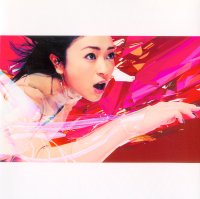 W
W"Traveling" is a song recorded by Japanese–American recording artist Hikaru Utada. It was released as the second single from her fourth studio and third Japanese language album, Deep River (2002). The track was written and composed by Utada, whilst production was handled by Utada, her father Teruzane Utada, and long-time collaborator Akira Miyake. Musically, "Traveling" is a dance-pop song, influenced by house music. Lyrically, it discusses human activities and dreams.
 W
W"Wait & See (Risk)" is a song recorded by Japanese–American singer Hikaru Utada for their third studio and second Japanese language album, Distance (2000). It was released on April 19, 2000 as the second single from the album in Japan. It was written and composed by Utada, whilst production and arrangement was handled by Utada and American duo Jimmy Jam & Terry Lewis. The single also included the two B-side tracks, "Hayatochiri" and "Fly Me to the Moon ", with the former song appearing on the parent album. Musically, "Wait & See (Risk)" is an R&B song, influenced by dance-pop and rock.
 W
W"You Make Me Want to Be a Man" is a song recorded by Japanese recording artist Utada for her fifth studio album and second English album, Exodus (2004). It was written and produced by Utada, with co-production by her father Teruzane Utada. The track was inspired by her relationship with her husband at the time, Kazuaki Kiriya. Its themes include sexism and understanding each other from a different perspective. "You Make Me Want to Be a Man" premiered on January 1, 2005 as the fourth and final single from the album. Self-described as an electronic and dance-pop song, it contains numerous elements including J-pop and techno.